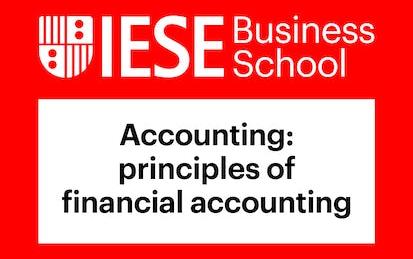

دوراتنا

المبادئ المحاسبية في التقارير والقوائم المالية
العديد من الأفراد في حاجة مُلحة ومستمرة لاستخدام القوائم المالية (Financial Statements)، تحديداً المستثمرون لأنهم من خلالها يتمكنون من اتخاذ القرارات الاستثمارية الصحيحة، كذلك تستخدمها الجهات الحكومية مثل مصلحة الضرائب كي تتمكن من تحديد الضريبة المستحقة، وأيضاً تستخدمها البنوك كي تتمكن من اتخاذ قرار إقراض الشركات من عدمه، لذلك يجب أن تُعدَّ القوائم المالية (Financial Statements) طبقاً لمعايير موحدة في كل دولة، وطبقاً لمعايير عالمية مشتركة بين جميع بلدان العالم كي يتمكن الجميع من قراءتها وتحليلها ومقارنتها بصورة صحيحة. هذه الدورة هي دورة تمهيدية؛ فهي تلقي الضوء على أساسيات الموضوع بشكل عام بهد
-
Course by

-
 Self Paced
Self Paced
-
 2 ساعات
2 ساعات
-
 عربي
عربي

Beyond the Financials: Insights, Analysis and Valuations
The objective of this course is to provide you with the knowledge and skills necessary to analyze, interpret, understand and use financial information to make informed decisions. We will discuss financial reporting from a user’s perspective, use a variety of tools to break apart financial reports into meaningful units for analysis, forecast financial statements, and value a firm. This course is intended to give you exposure to the issues facing users of financial statements.
-
Course by

-
 Self Paced
Self Paced
-
 12 ساعات
12 ساعات
-
 الإنجليزية
الإنجليزية

Accounting for Decision-Making
Learn how to read and interpret financial statements and manage costs to take informed business decisions.
-
Course by

-
 Self Paced
Self Paced
-
 27
27
-
 الإنجليزية
الإنجليزية

Financial Accounting and Analysis
Understand and analyse a company’s financial statements for informed decision-making.
-
Course by

-
 18
18
-
 الإنجليزية
الإنجليزية

قائمة التدفقات النقدية | Cash Flow Statement
قائمة التدفقات النقدية (Cash Flow Statement) من أهم القوائم المالية (Financial Statements) وذلك لأنها توضح الصورة الحقيقية والحالية لأموال الشركة وتحدد مصادر التمويل (Sources of Cash)، وفيما تم إنفاقها، وتأتي أهميتها من كونها تعتمد على مبدأ الأساس النقدي (Cash Basis) والذي يقوم بتسجيل النقد (Cash) الذي تم تحصيله أو صرفه بالفعل من الشركة، وذلك على عكس مبدأ أساس الاستحقاق (Accrual Basis) المستخدم في قوائم الدخل (Income statement)، والذي يسجل الإيرادات (Revenues) كلها سواء تم تحصيلها أم لا، والمصروفات (Expenses) كافة سواء تم سدادها أم لا. هذه الدورة هي دورة تمهيدية؛ فهي تلقي الضوء على أساسيات ال
-
Course by

-
 Self Paced
Self Paced
-
 2 ساعات
2 ساعات
-
 عربي
عربي

Financial Accounting
Learn the underlying concepts of financial accounting, accounting techniques and the preparation of financial statements with this ACCA-X course.
-
Course by

-
 Self Paced
Self Paced
-
 13
13
-
 الإنجليزية
الإنجليزية

Introduction to Business
This specialization is intended for novice business professionals seeking to develop management, leadership, finance, and digital marketing skills with the ultimate goal of preparing learners to operate or participate in the operation of a business. Throughout the three courses, learners will cover people management, the key features of leadership, strategic planning, search engine strategies, reputation management, content creation, common financial statements, cash flow, and expense management.
-
Course by

-
 Self Paced
Self Paced
-
 الإنجليزية
الإنجليزية

Financial Analysis - Skills for Success
In an era of thriving businesses, both small and large, it is crucial to possess a wholistic understanding of the financial building blocks of a successful organization. Through this 3-course Specialization in Financial Analysis, you will gain a well-rounded knowledge of key financial concepts that will help you apply an analytic mindset to understanding and driving organizational decisions and success. The courses in this Specialization focus on financial topics and organizational principles.
-
Course by

-
 Self Paced
Self Paced
-
 الإنجليزية
الإنجليزية

Finance for Non-Financial Managers
Finance is for “Non-financial Managers” who want to understand key financial principles and apply them in a real-world context. Over the course of the program window, you will work your way through a series of nine modules that move from understanding basic financial principles to applying financial analysis and ratios to drive decisions.
-
Course by

-
 Self Paced
Self Paced
-
 12 ساعات
12 ساعات
-
 الإنجليزية
الإنجليزية

Financial Statement and Ratio Analysis for Accountants
The objective of Financial Statement and Ratio Analysis for MBAs is to provide you with the knowledge and skills necessary to analyze, interpret, understand, and use financial information to make informed decisions. We will discuss financial reporting from a user’s perspective, use a variety of tools to break apart financial reports into meaningful units for analysis, forecast financial statements, and value a firm. This course is intended to give you exposure to the issues facing users of financial statements.
-
Course by

-
 Self Paced
Self Paced
-
 18 ساعات
18 ساعات
-
 الإنجليزية
الإنجليزية

Valuation and Financial Analysis For Startups
The Startup Valuation and Financial Analysis Specialization teaches two of the most often used methods to find the value of a startup. You’ll learn how to find the value of founder’s ownership before and after additional funding, how to read financial statements and make pro-forma statements, and how to determine the financial health and status of a startup and estimate future earnings and value.
-
Course by

-
 Self Paced
Self Paced
-
 الإنجليزية
الإنجليزية

Finance for Non-Financial Professionals
This course is for non-financial professionals, managers, and business leaders seeking to understand core finance and accounting concepts to drive organizational growth and impact financial decisions. You will gain a basic understanding of finance and accounting principles, enabling you to analyze financial information and assess the impact of your decisions across functional areas. Specific topics include financial analysis, planning, forecasting, budgeting, cash flow management, and strategic financing.
-
Course by

-
 Self Paced
Self Paced
-
 7 ساعات
7 ساعات
-
 الإنجليزية
الإنجليزية

Finance for Technical Managers
In Finance for Technical Managers, you will explore the fundamental principles of financial management. Topics include understanding and interpreting a company’s financial statements, the time value of money and its role in evaluating the economic viability of different projects, and the annual capital budgeting process every company performs when selecting which projects to fund. In addition, you will cover some highly practical topics, such as how to determine product costs, establishing a department’s annual budget, and ways of forecasting future sales.
-
Course by

-
 Self Paced
Self Paced
-
 الإنجليزية
الإنجليزية

Introduction to Financial Accounting: The Accounting Cycle
In this hands-on Specialization you will practice completing each step of the accounting cycle within Microsoft Excel, from analyzing and recording the first financial transactions of the year all the way through starting the new fiscal year. The skills covered in this course include recording in the journal, posting in the ledgers, preparing financial statements, recording and posting closing entries, as well as preparing trial balances.
-
Course by

-
 Self Paced
Self Paced
-
 الإنجليزية
الإنجليزية

Intuit Academy Bookkeeping
Whether you are starting out or looking for a career change, the Intuit Academy Bookkeeping program prepares you for a variety of jobs in public accounting, private industry, government, and non-profit organizations—and for the Intuit Academy Bookkeeping exam. If you are detail-oriented and passionate about solving clients’ problems, this program is for you. You’ll gain a foundational understanding of accounting principles and an introduction to QuickBooks Online through hands-on practice working with real-world accounting scenarios.
-
Course by

-
 Self Paced
Self Paced
-
 الإنجليزية
الإنجليزية

Financial Reporting
The Financial Reporting Specialization emphasizes the application of financial accounting principles and processes used to prepare an organization’s financial statements. The specialization addresses the measurement of assets, liabilities, equity, revenue, expenses, gains, losses, and the disclosure of additional information that allows users to understand the financial reports. We will discuss the financial accounting structure and review the fundamental accounting process used to prepare the financial statements and analyze them in the decision-making process.
-
Course by

-
 Self Paced
Self Paced
-
 الإنجليزية
الإنجليزية

Think like a CFO
The Think like a CFO Specialization will help you learn the language of finance. You will gain a firm understanding in Accountability, Operational Finance and Corporate Finance. By the end of the specialization, you’ll know what questions to ask and how to fit the different pieces together in order to develop a diagnosis and action plan to resolve a company’s financing dilemmas.
-
Course by

-
 Self Paced
Self Paced
-
 الإنجليزية
الإنجليزية

Bookkeeping Basics
This is the first course in a series of four that will give you the skills needed to start your career in bookkeeping. If you have a passion for helping clients solve problems, this course is for you. In this course, you will be introduced to the role of a bookkeeper and learn what bookkeeping professionals do every day. You will dive into the accounting concepts and terms that will provide the foundation for the next three courses.
-
Course by

-
 Self Paced
Self Paced
-
 16 ساعات
16 ساعات
-
 الإنجليزية
الإنجليزية

Financial Accounting Fundamentals
This course, developed at the Darden School of Business at the University of Virginia and taught by top-ranked faculty, will teach you the tools you'll need to understand the fundamentals of financial accounting. Concise videos, the financial records of a small business, and "your turn" activities guide you through the three most commonly used financial statements: the Balance Sheet, the Income Statement, and the Statement of Cash Flows.
-
Course by

-
 Self Paced
Self Paced
-
 14 ساعات
14 ساعات
-
 الإنجليزية
الإنجليزية
Financial Accounting: Foundations
In this course, you will learn the foundations of financial accounting information. You will start your journey with a general overview of what financial accounting information is and the main financial statements. You will then learn how to code financial transactions in financial accounting language. In the meantime, you will learn about the most important concept in contemporary financial accounting: accrual accounting. You will then critically analyze how firms recognize revenues.
-
Course by

-
 Self Paced
Self Paced
-
 14 ساعات
14 ساعات
-
 الإنجليزية
الإنجليزية

Accounting for Decision Making
Through this course, you will start by addressing the two “big questions” of accounting: “What do I have?” and “How did I do over time?” You will see how the two key financial statements – the balance sheet and the income statement - are designed to answer these questions and then move on to consider how individual transactions aggregate to make up these financial statements.
-
Course by

-
 30 ساعات
30 ساعات
-
 الإنجليزية
الإنجليزية

Trading Basics
The purpose of this course is to equip you with the knowledge required to comprehend the financial statements of a company and understand the various transactions that take place in the stock market so that you can replicate the strategies discovered by the extant academic literature. The first part of the course provides a brief introduction to financial statements and various common filings of firms. You will learn how to obtain information regarding a company's performance from them and use the information to build trading strategies.
-
Course by

-
 Self Paced
Self Paced
-
 8 ساعات
8 ساعات
-
 الإنجليزية
الإنجليزية
Understanding Financial Statements: Company Performance
This course is designed to provide a basic understanding of financial statements with an emphasis on the income statement. Building on the foundation formed in the first course, you will learn about the third of our three measurement questions and how the income statement helps to answer this final measurement question. Returning to the real business people introduced in the first course, this second course describes the basic content of income statement in a simple yet relevant context.
-
Course by

-
 Self Paced
Self Paced
-
 12 ساعات
12 ساعات
-
 الإنجليزية
الإنجليزية

Accounting: Principles of Financial Accounting
Financial Accounting is often called the language of business; it is the language that managers use to communicate the firm's financial and economic information to external parties such as shareholders and creditors. Nobody working in business can afford financial illiteracy. Whether you run your own business, work as a manager or are just starting your career, you want to understand financial information and be able to interact with accountants, controllers, and financial managers. You want to talk business! This course will provide you with the accounting language's essentials.
-
Course by

-
 Self Paced
Self Paced
-
 13 ساعات
13 ساعات
-
 الإنجليزية
الإنجليزية

Understanding Financial Statements: Company Position
This course is designed to provide a basic understanding of financial statements with an emphasis on the balance sheet. However, to understand accounting driven financial statements, it is important to recognize that accounting is less about counting and more about measuring. “What is it that is being measured?” Well, as the course unfolds, you will learn about the three measurement questions and how the balance sheet helps to answer the first two of these questions.
-
Course by

-
 Self Paced
Self Paced
-
 13 ساعات
13 ساعات
-
 الإنجليزية
الإنجليزية



